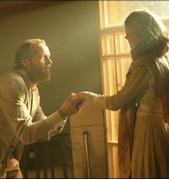SITE GUIDE
SEARCH
REVIEWS
REVIEW ARCHIVES
ADVERTISING AT CURTAINUP
FEATURES
NEWS
Etcetera and
Short Term Listings
LISTINGS
Broadway
Off-Broadway
NYC Restaurants
BOOKS and CDs
OTHER PLACES
Berkshires
London
California
New Jersey
DC
Connecticut
Philadelphia
Elsewhere
QUOTES
TKTS
PLAYWRIGHTS' ALBUMS
LETTERS TO EDITOR
FILM
LINKS
MISCELLANEOUS
Free Updates
Masthead
Writing for Us
A CurtainUp  London Review
London Review
 London Review
London ReviewUncle Vanya
|
I’m turning into my mother.
— Vanya
|

Iain Glen as Vanya and Lucinda Millward as Yelena (Photo: Sheila Burnett) |
It is this context which gives Chekhov such wide reaching powers of political foresight as he sees Russia struggle economically, deprived of the free labour of serfdom. It is the role of the overworked doctor, Astrov, here heroically played by an impassioned William Houston, to show us what is happening ecologically to his homeland.
Mike Poulton’s new version, besides its environmental emphasis, has a naturalness of speech so that characters disarmingly tell each other what they are really thinking. “There’s no longer any shape to my life, ” says the doctor with Houston’s splendid resonating voice. Both Astrov and Vanya (Iain Glen) are very likeable as Chekhov’s gentle comedy is allowed to surface so that they both are realistic about their situation, yet powerless to change anything. Glen delights as Vanya acidly listing off the professor’s many flaws. Both Astrov and Vanya hark back to a day when they might have led different lives. Mike Poulton also allows everyone to drown their sorrows in drink, even Yelena knocks back shots of spirits.
David Yelland has a lot of fun with Serebryakov, the insufferably pompous, self pitying and selfish professor whom Vanya and Sonya (Charlotte Emmerson) slave to support in relative luxury. The break to the household’s routine with the professor keeping odd hours and demanding that a servant makes him tea in the small hours of the morning contrasts the self centred behaviour of the academic with the self sacrificing Vanya. Sonia stomps in workmen’s boots while the professor wears silk. Caroline Blakiston as the mother is magnificent in a Russian curved headdress as she stares, coldly and impassively, at her son Vanya’s plea to intercede on Sonia’s behalf. When Serebriakov turns on Vanya and calls him “a mere clerk” we feel the hurt and condemn the ingratitude. David Shaw-Parker as Telegin or “Waffles” plays the guitar and is sympathetic but terribly hurt when he is called an old sponger in the village.
Charlotte Emmerson’s workaday Sonya is downtrodden and sad but accepting and Lucinda Millward’s cold Yelena is the least likable of the female characters, if you can forgive Maria, the elderly mother her blindness to real merit. Yelena’s character is the only one you feel you might actually prefer to see from a distance. Her beauty captivates both Vanya and Astrov and as she vacillates and we don’t really know why she married the professor. She claims it may have been love but mentions his “fame, his brilliant career” that captivated her.
On the walls of William Dudley’s set there are black and white family portraits and rays of charcoal drawn light and shade radiating out from the centre of the walls with the audience seated at the same level in two rows on all four sides. The effect of this closeness is to place us into the same room as the family, to involve the audience. The portraits remind us of all those who once lived here as this play heralds the social change that is to come with the revolution. At the four corners of the room are doors or windows which move in the interval to give a differing perspective of the room and the director does not allow anyone’s back to you for long. Astrov’s emphasis on the future is sobering as we look at post revolutionary Russia today, again with extremes of wealth and corruption.
This production is practically sold out but ring for returns because I promise it will be worth it. It was on originally in March and has returned so that more might see it. You can understand why they are already calling The Print Room a mini Donmar.
|
Subscribe to our FREE email updates with a note from editor Elyse Sommer about additions to the website -- with main page hot links to the latest features posted at our numerous locations. To subscribe,
E-mail: esommer@curtainup.comesommer@curtainup.com
put SUBSCRIBE CURTAINUP EMAIL UPDATE in the subject line and your full name and email address in the body of the message -- if you can spare a minute, tell us how you came to CurtainUp and from what part of the country. |
| Uncle Vanya
Written by Anton Chekhov Directed by Lucy Bailey Starring: Iain Glen, William Houston, Charlotte Emmerson, David Yelland, Caroline Blakiston, Lucinda Millward With: Marlene Sidaway, David Shaw-Parker, Andrew Hanratty Design: William Dudley Lighting: Richard Howell Sound: Gregory Clarke Running time: Two hours and 30 minutes with one interval Box Office: 020 7221 6036 Website: www.the-print-room.org Booking to 7th July 2012 Reviewed by Lizzie Loveridge based on 19th June 2012 performance at the Print Room, 34 Hereford Road London W2 5AJ (Tube: Notting Hill Gate and then a bus or walk) |
|
REVIEW FEEDBACK Highlight one of the responses below and click "copy" or"CTRL+C"
Paste the highlighted text into the subject line (CTRL+ V): Feel free to add detailed comments in the body of the email . . . also the names and emails of any friends to whom you'd like us to forward a copy of this review. |




